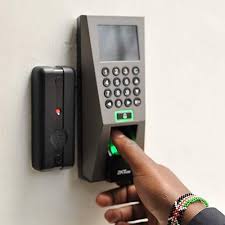
Discover the importance of access control systems in Ghana's financial industry. Learn how banks and fintech firms can enhance security, prevent fraud, and comply with regulations using physical, logical, and integrated access control solutions.
March 27, 2025
Access Control Systems in Ghana's Financial Industry
Banks, fintech startups, and other financial institutions are integral to the nation's economic development. As more people turn to digital banking, mobile money, and online financial services, institutions handle vast amounts of sensitive customer and transactional data daily. This rapid digitization, while beneficial, also brings increased risks, such as cyber threats, fraudulent activities, and unauthorized access, which are now pressing concerns for the industry.
To protect both financial assets and customer trust, financial institutions must invest in robust security measures. One of the most effective ways to do this is through access control systems, which regulate who can access physical locations, digital platforms, and sensitive data. Whether it's securing a bank's vault, restricting employee access to confidential records, or safeguarding online banking systems, access control plays a vital role in financial security.
This article explores why access control is essential for Ghana's financial institutions, the different types of systems available, and best practices to implement them effectively.
-
Why Access Control Matters in Ghana's Financial Institutions
Financial institutions in Ghana, including banks, microfinance companies, insurance firms, and fintech startups, manage vast amounts of customer data and transactions. Any security breach can lead to severe financial losses, regulatory penalties from the Bank of Ghana, and reputational damage. Here’s why access control is crucial:
-
Protection Against Unauthorized Access: Prevents unauthorized personnel from entering restricted areas such as vaults, server rooms, and executive offices.
-
Regulatory Compliance: Meets industry regulations such as the Data Protection Act, 2012 (Act 843) and banking guidelines set by the Bank of Ghana.
-
Fraud Prevention: Limits access to critical systems, reducing insider threats and external breaches.
-
Audit and Accountability: Provides digital records of access logs, which can be used for audits and investigations.
-
Operational Efficiency: Streamlines security management by automating access permissions and integrating with other security solutions.
Types of Access Control Systems Used in Ghanaian Financial Institutions
1. Physical Access Control Systems
These systems restrict physical entry to buildings, offices, and secure areas using various methods:
-
Card-Based Access: Employees use RFID or NFC-enabled cards to gain access.
-
Biometric Authentication: Uses fingerprints, facial recognition, or iris scans for identity verification.
-
Keypad Entry Systems: Requires a unique PIN for access to specific locations.
-
Turnstiles and Security Doors: Prevents tailgating and unauthorized entry.
2. Logical Access Control Systems
Logical access control systems manage access to digital systems, networks, and applications:
-
Multi-Factor Authentication: Requires multiple verification methods such as passwords, biometrics, and one-time passcodes.
-
Role-Based Access Control: Assigns access based on job responsibilities.
-
Single Sign-On: Enables users to access multiple systems with a single set of credentials.
-
Privileged Access Management: Restricts high-level access to sensitive data and systems.
3. Integrated Access Control Systems
Many financial institutions in Ghana use a combination of physical and logical access controls integrated into a unified security framework. These systems leverage advanced technologies such as:
-
AI and Machine Learning: Detects anomalies and unauthorized access attempts in real-time.
-
Cloud-Based Access Control: Enables remote monitoring and management of access permissions.
-
Blockchain Technology: Enhances security by decentralizing authentication processes.
Best Practices for Implementing Access Control Systems in Ghana
1. Risk Assessment and Policy Development
Ghanaian financial institutions should conduct thorough risk assessments to identify potential security vulnerabilities. Based on these findings, they should establish clear access control policies outlining:
-
Who can access what resources
-
Authentication and authorization protocols
-
Procedures for granting, revoking, and auditing access
2. Multi-Layered Security Approach
Relying on a single access control method is not enough. A multi-layered approach combining physical, logical, and procedural security measures enhances protection against sophisticated threats.
3. Regular Audits and Compliance Checks
Periodic security audits help identify gaps in access control measures and ensure compliance with the Bank of Ghana’s cybersecurity directives. Automated audit logs can help track access events in real-time.
4. Employee Training and Awareness
Employees play a crucial role in access control. Regular training programs should educate staff on:
-
The importance of access control policies
-
Recognizing phishing and social engineering threats
-
Proper handling of authentication credentials
5. Incident Response and Contingency Planning
Despite robust security measures, breaches can still occur. Financial institutions in Ghana must have a response plan in place that includes:
-
Immediate access revocation for compromised accounts
-
Investigation and forensic analysis
-
Communication protocols for regulatory reporting and customer notifications
Conclusion
Access control systems are an indispensable component of financial security, protecting institutions from fraud, data breaches, and unauthorized access. By adopting a multi-faceted approach that combines physical and logical access controls, Ghanaian financial organizations can enhance security, comply with regulations, and build customer trust. As technology evolves, integrating AI-driven and blockchain-based access control solutions will further strengthen financial security frameworks in Ghana.
At Aberfo Technology Solutions, we provide a holistic IT, Cloud Services and Access Control solutions for financial institutions in Ghana. Contact us for a free assessment on 0544664343. -
